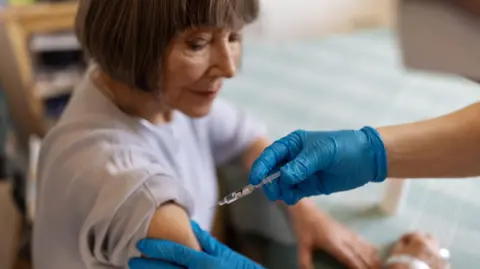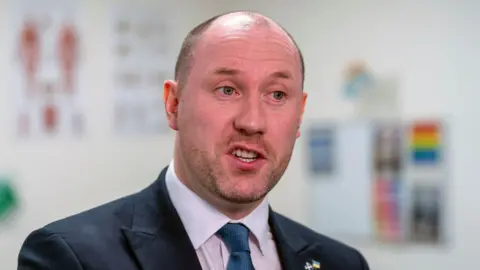RSV vaccine cuts hospital stays for older people
 Getty Images
Getty ImagesA vaccination programme introduced to protect babies and older adults against a dangerous respiratory disease has cut hospital stays for older people.
The RSV (Respiratory syncytial virus) jab was given for the first time in Scotland last August.
Research by Public Health Scotland (PHS), published in The Lancet Infectious Diseases Journal, shows uptake of the vaccine resulted in a 62% reduction in RSV-related hospitalisations among the eligible 75-79 age group.
Health Secretary Neil Gray welcomed the report and said the Scottish government had invested £4.2m for health boards to roll out vaccines.
RSV affects the breathing system and can cause severe illness in vulnerable groups, including infants and older people.
It is the leading cause of emergency respiratory admissions to hospital in infants.
In 2022-23, more than 1,500 infants under the age of one and more than 500 people aged 75 and over were hospitalised with RSV, according to Public Health Scotland.
Across the UK as a whole, it results in 25-30 infant deaths each year.
While for many the symptoms are mild, the infection is easily spread and 90% of children will catch it within the first two years of their lives.
 PA Media
PA MediaThe PHS research found a significant effect on the older population who were eligible for the vaccine.
By the end of November, 68% of eligible older adults had received their RSV jabs which caused a reduction in hospital care for the virus.
Neil Gray said: "Once again we see evidence of the role which vaccinations play in preventing serious illness and keeping people out of hospital.
"We were pleased to be the first nation in the UK to introduce the new RSV vaccine in time to maximise the benefit to the more vulnerable ahead of winter.
"This research demonstrates just how many people avoided ending up in hospital as a result.
Dr Sam Ghebrehewet, head of immunisation and vaccination at PHS, said the body would continue working with local health boards to ensure as many people as possible receive their vaccine.
He said: "Vaccinations have played a major role in protecting the health of people across the globe over the last 50 years and the success of the RSV programme marks another significant step in protecting the population of Scotland against preventable diseases."
The success of the RSV vaccine comes after a warning in early January that there had been a decline in uptake of the flu jab.
Around two thirds of those classed as being at risk for flu and three quarters of those at risk of Covid were at that point yet to be vaccinated.

This is a success story showing vaccines protect against serious illness and death. But key to that is to ensure high numbers of people come forward to get their jab.
There has been a drop in uptake for many immunisations in Scotland in recent years. Take flu - for older people uptake was still high at 74%, but it was 86% in 2022.
For younger people considered at risk, it was 34% compared to 57% two years previously and for social care staff the number coming forward for jags dropped to just 17% - half the number in 2022. A bad flu season entailed with many more becoming seriously ill and needing a hospital bed than may have done if they had been immunised.
In 2023, health boards took over running the vaccination programme from GPs and there has been criticism that people have to travel further to a clinic or may struggle booking appointments.
In fact NHS Highland will return to a hybrid model involving GPs this year.
Inevitably there will be some vaccine fatigue, but experts say for uptake to remain high, it has to be convenient.

What is RSV and what are the symptoms?
RSV is a common and highly infectious virus affecting the breathing system.
Symptoms of RSV usually start within a few days of getting infected.
According to the NHS, most people only get cold-like symptoms, such as:
- a runny or blocked nose
- sneezing
- a cough
- tiredness
- a high temperature
Babies with RSV may also be irritable and feed less than usual.
If RSV leads to a more serious infection (such as bronchiolitis) it may also cause:
- a cough that gets worse
- faster breathing or long gaps between breaths
- difficulty feeding or eating
- noisy breathing (wheezing)
